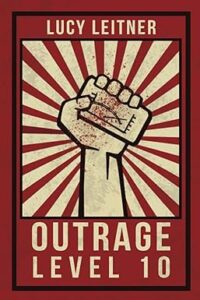Outrage: Level 10 by Lucy Leitner
Blood Bound Publishing, 2021
ISBN: 9781940250496
Available: Paperback, Kindle edition
Buy: Amazon.com
Outrage Level 10 succeeds as both a thriller and a darkly humorous look at today’s overly sensitive “cancel culture” society taken to extremes. It’s an exciting story, and the setting will force readers to ask questions about where we are headed as a society, and what we would consider a “perfect’” world.
It’s a strange future that Alex Malone, ex-head breaker for the now-defunct Pittsburgh Penguins (a hockey team) and now a cop, lives in. There is no more government, just the Speaker, as the mouthpiece of the People; the Hammer, who is the People’s enforcer and… that’s it. It’s all the will of the People in regards to policy, crime, and everything else, decided by popular vote of the citizens through their phones and various social applications. Almost all crime consists of someone offending someone else. Once it’s been posted online, if the outrage meter hits high enough through people commenting, the offenders face the Hammer, who most likely will condemn the perpetrators to the mysterious Maze, from which almost no one returns. People do live much longer, since all diseases have been cured, or the causing substances banned, but is it worth the price?
That’s the world of Alex, and as a cop, he’s a member of an almost unnecessary profession (apparently “defund the police” REALLY took hold) since everything is by popular fiat, and everyone is policing each other. It doesn’t help that the few cops left are reviled by pretty much everyone. Alex tries a new drug designed to treat his CTE, and the drug, through visions, pulls him into a mystery involving senior citizens disappearing from retirement homes. As Alex soon finds out, it’s hard to solve a case that affects the few people left in power, and even harder when everyone is looking for an excuse, real or imagined, to take him down.
The plotline is an intriguing mystery and a tough nut to crack. Alex makes an excellent protagonist, and is sympathetic as a person who really has no value in a politically correct society. That is, until he remembers the old police motto, “to protect and serve”. In Leitner’s world, protecting means eliminating anyone whom you disagree with, not helping for the common good.
Leitner”s vision of a world gone crazy provides the excellent story backdrop. She wisely keeps her own views out of it, instead using her razon-sharp humor to get the point across, without coming off as preachy. That’s the mark of excellent satire; the ability to write without tipping your own hand to the readers. She’s shown this skill in other works like Bad Vibrations, and it’s on full display here. Leitner has created a terrifying world, where people are condemned for accidentally serving the wrong food, since that can be seen as aggression or some sort of -ism.
Bottom line: another excellent work from one of the smartest writers of dystopian satire today. Recommended.
Reviewed by Murray Samuelson









Follow Us!